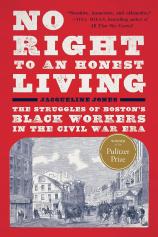No Right to an Honest Living: The Struggles of Boston's Black Workers in the Civil War Era
Review
No Right to an Honest Living: The Struggles of Boston's Black Workers in the Civil War Era
In NO RIGHT TO AN HONEST LIVING, award-winning writer Jacqueline Jones tackles a thorny subject as she examines the multiple layers of racism that affected the city of Boston, Massachusetts, in the years before, during and after the Civil War. Much of the material mined here can still be seen in undercurrents of today’s contrasting views of Black people and their “place” in society.
"[Jones'] zeal for her subject, the people and their struggles resonates throughout this scholarly work. NO RIGHT TO AN HONEST LIVING provides rich study for a new perspective on how racial stereotyping has developed..."
In 1847, Jones recounts, a group of 66 Black former slaves arrived in Boston, ready to assume the mantle of freedom and the responsibilities and rights it would seem to have entailed. But their experiences were in many cases far different from their expectations. Bostonians, even some of the abolitionist stripe, were reluctant to open their boundaries to southern migrants, with economy being a potent factor in their thinking. How could the North persist in the wealth wrought by clothing manufacture if the South stopped producing cotton through the work of slaves --- i.e., cheap labor keeping prices low?
The rhetoric of freedom and citizenship was extant among white proponents of abolition. Boston was more liberal than many other Northern cities, and Massachusetts more so than surrounding states. Still, the “Edloe” group (named for their former owner) and all those who followed would encounter complex racial bias that gradually morphed into racial stereotyping.
As Jones parses this in her wise and extensively researched framework, Black people were refused many jobs --- which instead frequently went to white Irish immigrants deemed more ambitious --- and often reluctantly wound up on the rolls of the city’s charities and the civic dole. This, in turn, identified them as people who did not want to work, were inherently migratory and lacked the will to succeed. While, as Jones writes, “Most white Bostonians accepted Black men at the ballot box and the jury box,” for the most part they were consigned to “casual, ill-paid, dead-end jobs.” Through these early examples, Jones paints a subtle portrait of the many ways in which American society has evolved, with ingrained, history-bound labels and tacit misconceptions that unfortunately endure.
Jones is a noted historian, the Ellen C. Temple Professor of Women’s History Emerita at the University of Texas, and winner of the Bancroft Prize for LABOR OF LOVE, LABOR OF SORROW. Her zeal for her subject, the people and their struggles resonates throughout this scholarly work. NO RIGHT TO AN HONEST LIVING provides rich study for a new perspective on how racial stereotyping has developed, with roots in war and (very potently, it seems) economic factors that barred those who most desperately needed --- and would have welcomed --- simple, decent, well-paid employment.
Reviewed by Barbara Bamberger Scott on January 13, 2023
No Right to an Honest Living: The Struggles of Boston's Black Workers in the Civil War Era
- Publication Date: January 7, 2025
- Genres: History, Nonfiction
- Paperback: 544 pages
- Publisher: Basic Books
- ISBN-10: 1541607023
- ISBN-13: 9781541607026




